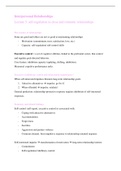Interpersonal Relationships
Lecture 5: self-regulation in close and romantic relationships
The science of relationships
Some are good and others are not so good at maintaining relationships
- Motivation (commitment, trust, satisfaction, love, etc.)
- Capacity: self-regulation/ self-control skills
Executive control = a set of cognitive abilities, linked to the prefrontal cortex, that control
and regulate goal-directed behavior.
Core feature: inhibition capacity (updating, shifting, inhibition).
Measured: cognitive performance tasks.
Executive (inhibition) control and relationship maintenance?
When self-interested impulses threaten long-term relationship goals:
1. Attractive alternatives → impulse: go for it!
2. When offended → impulse: retaliate!
General prediction: relationship-protective response requires inhibition of self-interested
responses.
Summary and related findings
Self-control (self-report, executive control) is associated with:
- Coping with attractive alternatives
- Accommodation
- Forgiveness
- Sacrifice
- Aggression and partner violence
- Common element: from impulsive response to relationship-oriented response
Self-interested impulse → transformation of motivation → long-term relationship interest
- Commitment
- Self-regulation/ inhibitory control





